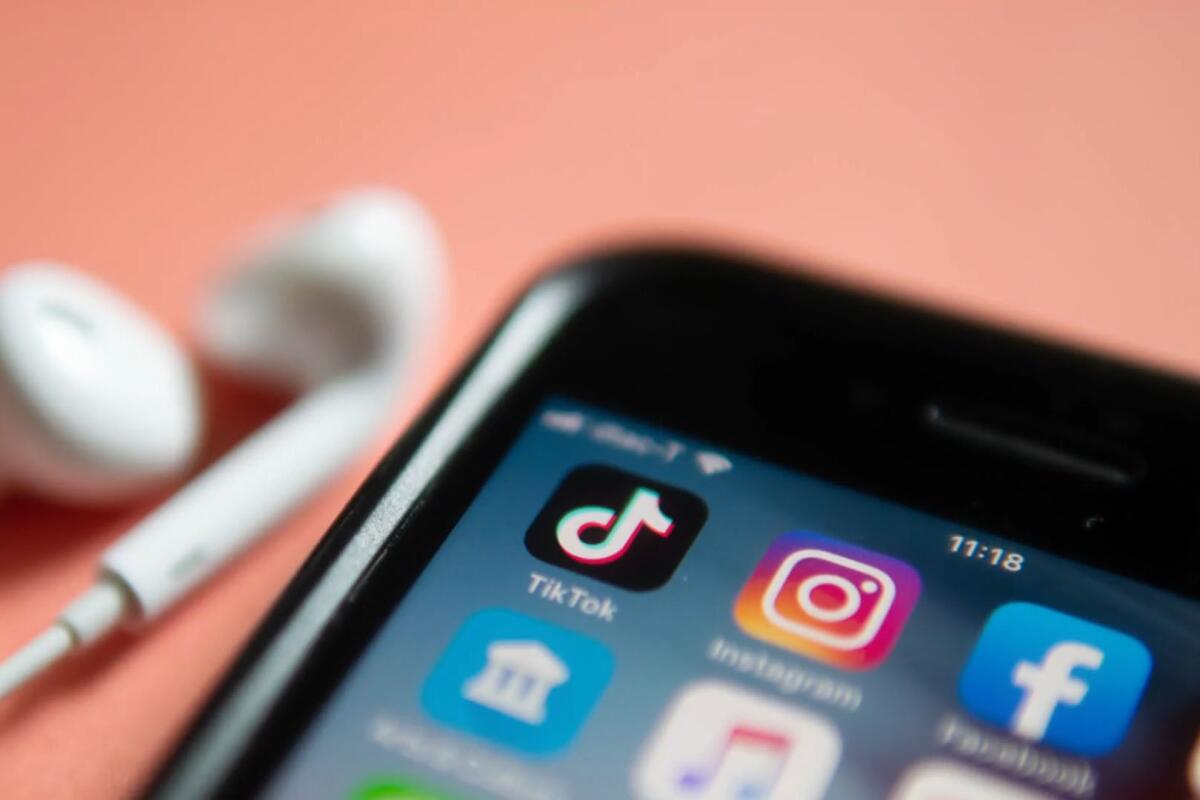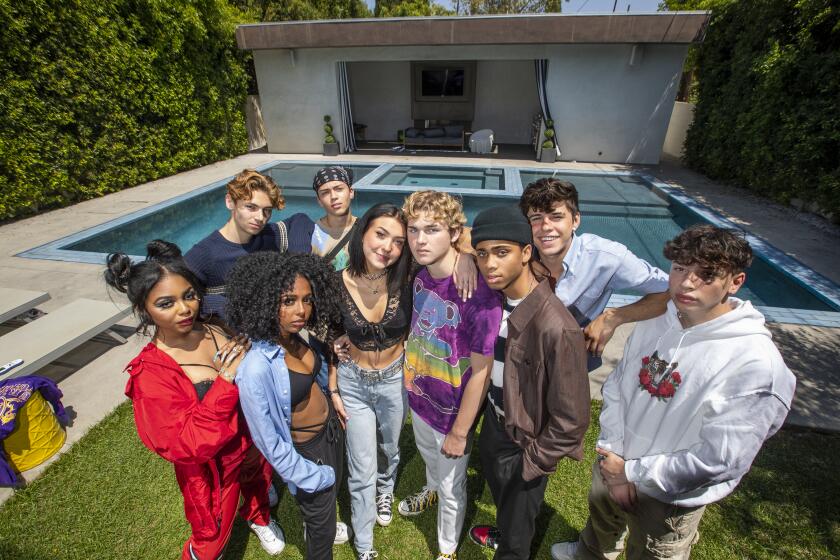Trump signs executive order to ban TikTok, WeChat

- Share via
President Trump made good on his threat to ban TikTok on Thursday, issuing an executive order that will bar the wildly popular video app’s parent company, ByteDance, from conducting business transactions with other American companies beginning in 45 days.
A separate order bans business transactions involving WeChat, a popular communications and commerce app owned by the Chinese internet giant Tencent.
The orders come after the Trump administration deemed apps from Chinese software companies national security threats, warning that they could put Americans’ privacy in danger.
“This data collection threatens to allow the Chinese Communist Party access to Americans’ personal and proprietary information — potentially allowing China to track the locations of federal employees and contractors, build dossiers of personal information for blackmail, and conduct corporate espionage,” reads the text of the TikTok order.
L.A.’s TikTok creators earn thousands of dollars a month. Trump’s threat of a potential ban has them concerned.
TikTok has said it has not and will not give information to the Chinese government. TikTok said its U.S. user information is stored in the U.S. and backed up in Singapore.
Chinese Ministry of Foreign Affairs spokesman Wang Wenbin said at a media briefing Thursday that the Trump administration’s actions against Chinese apps were “typical hegemonic behavior that runs against market principles and international trade rules” and an attempt to maintain high tech monopoly.
The executive order is a blow to TikTok, which has achieved massive global growth as people looked for ways to be entertained at home during the COVID-19 pandemic. Music artists have used TikTok to promote their songs; talent agencies check out the videos for rising talent; and young video creators in L.A. have made tens of thousands of dollars each month through brand deals on TikTok.
TikTok said it was shocked by the executive order and has tried to engage with the U.S. government for nearly a year.
“What we encountered instead was that the Administration paid no attention to facts, dictated terms of an agreement without going through standard legal processes, and tried to insert itself into negotiations between private businesses,” TikTok said in a statement.
The company said the government’s action risks undermining global business trust in the U.S. government’s commitment to law.
“We will pursue all remedies available to us in order to ensure that the rule of law is not discarded and that our company and our users are treated fairly — if not by the Administration, then by the U.S. courts,” TikTok said.
TikTok is in the process of exploring a deal to sell its U.S. operations to Microsoft. Trump has said he is open to such a deal as long as some of the proceeds go to the U.S. Treasury, a condition that raises legal questions.
“There’s nothing specific that says you can do this,” said Will Delgado, a founding partner at DTO Law. “You do have a president that has a different type of mind-set than previous presidents and maybe it just hadn’t occurred to other presidents in the past.”
The purchaser, who would have legal standing to challenge such a requirement, in this case has already signaled it may acquiesce. Microsoft in a statement Sunday said it is “committed to acquiring TikTok subject to a complete security review and providing proper economic benefits to the United States, including the United States Treasury.”
But if such a deal goes through, it could deter similar acquisitions in the future.
“One wonders about the chilling effect at a very practical level of what might happen in a future transaction, if somebody is fearful of having to pay such a fee and they don’t want to. Might that discourage a transaction from ... even coming up?” Delgado said.
TikTok employs about 1,500 people in the U.S. and plans to add 10,000 more over the next three years. Its largest U.S. office is in Culver City.
Responding to the Trump administration’s intensifying rhetoric, the company recently said it will open a transparency and accountability center in Culver City later this year where outside experts can view its content moderation policies and see the code that powers its algorithms.
“With our success comes responsibility and accountability,” CEO Kevin Mayer wrote last month. “The entire industry has received scrutiny, and rightly so. Yet, we have received even more scrutiny due to the company’s Chinese origins. We accept this and embrace the challenge of giving peace of mind through greater transparency and accountability.”
There are signs the U.S. government’s threats to ban TikTok and a ban recently enacted in India are having an effect on its popularity. Last month, the TikTok app was installed 65.3 million times on mobile devices, down 25% from June, according to San Francisco mobile research firm Sensor Tower.
Seeking to defend its dominance in social media, Facebook’s Instagram unit this week launched Reels, a TikTok lookalike feature within its app that allows users to upload videos of up to 15 seconds and add music from tens of millions of songs in its library. Instagram has a built-in audience of more than 1 billion monthly active users.
The action against WeChat and its parent company Tencent comes less than a month after White House advisor Peter Navarro first mentioned the app as a potential target for executive action.
WeChat is the most-used messaging system in the world with more than a billion users, and it is an operating system unto itself in the Chinese market, where nearly 99% of smartphone owners use the app. WeChat users can pay for lunch, watch a video broadcast, apply for a loan and call a cab from the Chinese ride-hailing company Didi Chuxing without leaving the app.
The app is used around the world by people with friends and family in China, where most other leading chat apps such as Facebook’s WhatsApp are banned. But recent investigations have found that WeChat is used to extend Chinese state surveillance and censorship, blocking messages from international users deemed hostile to the Chinese government, according to NPR, or analyzing messages from non-Chinese users for taboo content, according to a University of Toronto report.
Still, some experts warned that the executive order could have serious consequences.
“Like just about everything else Trump does, this EO is extreme, poorly conceptualized, and will unleash counterproductive consequences for a secure and open global Internet,” said Ronald Deibert, director of the University of Toronto’s Citizen Lab. “While it is true that WeChat undertakes censorship and surveillance (as our research has clearly shown), banning U.S. citizens from interacting with the platform and its parent company Tencent will produce chaos for Internet users and businesses, invite retaliation from China, and present a blueprint for authoritarians the world over to emulate. It’s the policy equivalent of a jingoistic temper tantrum.”
WeChat’s parent company, Tencent, also owns or partly owns a number of major American video game companies. L.A.’s Riot Games, the studio behind “League of Legends,” is a fully owned Tencent subsidiary, and Tencent owns a 40% stake in “Fortnite” maker Epic Games, and single-digit stakes in major studios Activision Blizzard and Ubisoft.
A White House official on Thursday night clarified that the executive order concerning WeChat only blocks transactions related to WeChat, not those involving other Tencent holdings.
“We are reviewing the executive order to get a full understanding,” Tencent said in a statement.
Times staff writer Alice Su in Shanghai contributed to this report.
More to Read
Get the L.A. Times Politics newsletter
Deeply reported insights into legislation, politics and policy from Sacramento, Washington and beyond. In your inbox three times per week.
You may occasionally receive promotional content from the Los Angeles Times.













